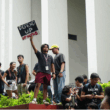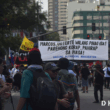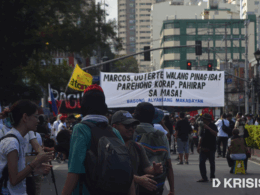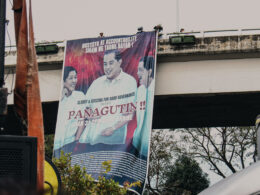Having been a regular shabu user for almost three decades, Toro, as he opted to be called, knows almost every drug user and pusher in Barangay UP Campus.
For many of his fellow users, shabu helps them out of exhaustion and enables them “to do more work than usual,” said the 46-year-old former drug user, who makes a living for his family by installing glass panels for a construction hardware store in Quezon City.
“Marami kang magagawa, para kang si Superman,” Toro said. “Hindi mo mararamdaman yung pagod,” he said.
(You can accomplish a lot, you’re like Superman. You don’t feel the fatigue.)
The local drug trade in the area, however, has seen a significant decline since President Rodrigo Duterte launched his war on drugs following his election win last May.
As door-to-door visits in the barangay became more frequent, so did the sight of blood-drenched bodies, lying on street gutters, wrapped in black garbage bags. Fearing for their lives, Toro and several of his peers decided to quit the vice.
Asked how many Barangay UP Campus residents have been killed in anti-drugs operations since July, Toro began uttering one name after the other, counting on his fingers and pausing from time to time while recalling the fate of his friends allegedly felled by either vigilante groups or police units.
Toro could only remember six — a few names short of the barangay’s official count. Local authorities have documented a total of 14 drug-related deaths since the start of the war on drugs.
“Minsan sa news na lang namin nalalaman [na patay na pala sila],” Toro said.
(Sometimes we would only find out from the news that they’re dead.)
This string of drug-related killings in the barangay had gone almost unnoticed until last September, after two suspected drug pushers were killed in a buy-bust operation conducted by the Quezon City Police District (QCPD) Station 9 at the UP Arboretum, Metro Manila’s last remaining forest area.
In an attempt to dissuade residents from taking part in the underground drug trade, UP Campus barangay chairperson Isabelita Gravides said door-to-door visits are conducted in line with Oplan Tokhang, what used to be the Philippine National Police (PNP)’s primary anti-drugs campaign.
Even before the war on drugs, she said, door-to-door visits and dialogues in the barangay were already common due to a spike of rape cases and reports of mental illnesses associated with drugs abuse in past years.
A total of 136 drug users and pushers have been identified in Barangay UP Campus from July to September last year, according to records from the QCPD. Around 40 percent were listed as unemployed, while a majority of users came from low-income households and held blue collar jobs.
Across the country, more than 3,000 alleged drug users and pushers have been killed in the first four months of the brutal campaign.
Anti-drug operations were temporarily suspended in late January, after a South Korean business was found to have been abducted under the cover of the war on drugs and killed by rogue cops inside Camp Crame.
President Duterte lifted the month-long suspension early this week, claiming a sharp increase in drug-related activities during that period.
Prior to the suspension of anti-drugs operations, UP Diliman Police (UPDP) officer-in-charge Ruben Villaluna said anti-drugs operations were concentrated on the informal settlements outside the campus due to the suspected presence of drug labs in nearby communities and the continuing underground drug trade in the area.
The UP Diliman campus is surrounded by 16 villages, consisting of numerous informal settlements along with housing units for UP employees. Students and faculty members from UP and other schools nearby also reside in the area as boarders or tenants.
Meanwhile, the academic facilities of the campus have so far been spared from such police operations, he added.
Under an agreement signed between UP and the Department of National Defense in 1989, police and military operations within all UP campuses must first be coordinated with the university president or campus chancellor. The accord was reinforced by a second agreement between the university and the Department of the Interior and Local Government in 1992.
However, UP Diliman Chancellor Michael Tan said that the QCPD did not inform school administrators about the September buy-bust operation at the UP Arboretum, which sits on UP property and lies just a few hundred meters from the ingress of University Avenue.
Anti-drugs operations were concentrated on the the informal settlements outside the campus due to the suspected presence of drug labs in nearby communities and the continuing underground drug trade in the area.
Since both agreements fail to define the boundaries that limit the PNP’s access to university property, it is unclear to university authorities if the Arboretum buy-bust operation violated the agreements.
Tan also said the two accords are basically “toothless,” since any violation against these agreements on the part of the police or military does not entail punitive action.
“‘Pag lumabag sila [sa agreements], we protest,” he said. “It’s still important na when we discover [such violations], nagsasalita din tayo, and we make sure to publicize [our statements].”
(When they violate agreements, we protest. It’s still important that when we discover such violations, we speak up, and we make sure to publicize our statements.)
But while the war on drugs has stopped short of the campus gates, students and faculty members from the university are no strangers to the local drug trade.
Former drug pushers like Matet, as she opted to be called, rarely met these students face-to-face. The 32-year-old “runner” from Barangay UP Campus said most student buyers transacted with informal settlers who had links to local runners and suppliers in Barangays UP Campus, Culiat and Balara.
Matet, a vendor in UP Diliman, stopped selling shabu for her suppliers since the start of Duterte’s war on drugs. She said the local drug trade boomed from the 1980’s up to the early 2000’s, with buyers coming in from the university and neighboring barangays. Recent anti-drugs operations, however, have resulted in a significant decline in both customers and supplies.
The underground market thrived on the sale of shabu and marijuana. The former drug pusher said she used to sell shabu at P200 per sachet, which was just a third of a thumb in length and width. While prices remained almost unchanged in the past decade, she added, the amount of shabu per sachet has decreased significantly over the years.
In the midst of this local drug trade and the ongoing war on drugs, Tan is determined to protect students from drug abuse and the threat of vigilante killings.
The chancellor said the university is currently consolidating its anti-drugs programs into a more “unified” anti-drugs campaign, which includes both drug education and rehabilitation.
“UP Diliman doesn’t have one drug program,” he said. “We are actually working on it.”
This article first appeared in KRISIS (Issue 1, AY 2016-2017) – Self-Built Unit (SBU) Edition on March 17, 2017.









